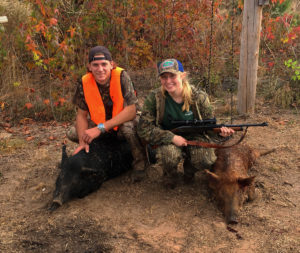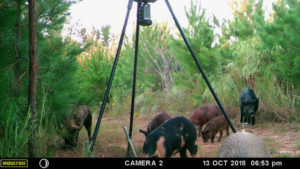 The meat of feral hogs is pretty good but we would rather have more deer, thanks very much.
The meat of feral hogs is pretty good but we would rather have more deer, thanks very much.
Since 2013 I have hunted on a piece of land we affectionately call the Crystal Pig Hunt Club in central Georgia with my brother Paul and Gary Cooper of AgNet Media. The hogs started moving in about 2016 and have since made a dent in the deer population because they don’t get along well. Pictured here is godson and nephew Luke with his lovely wife Hope and a couple of hogs they got at the camp.
So, we were happy to hear about USDA’s new Feral Swine Eradication and Control Pilot Program (FSCP) in a joint effort between USDA’s Natural Resources Conservation Service (NRCS) and Animal and Plant Health Inspection Service (APHIS). Applications are being accepted through Aug. 19, 2019, for partners to carry out activities as part of these pilot projects in select areas of Alabama, Arkansas, Florida, Georgia, Louisiana, Mississippi, North Carolina, Oklahoma, South Carolina and Texas.
 Where brother Paul lives near Madison, Georgia the feral hog population has been a problem since at least 2014. The 2018 Farm Bill included this new pilot program to finally help address the threat that feral swine pose to agriculture, ecosystems and human and animal health.
Where brother Paul lives near Madison, Georgia the feral hog population has been a problem since at least 2014. The 2018 Farm Bill included this new pilot program to finally help address the threat that feral swine pose to agriculture, ecosystems and human and animal health.
Feral swine have been reported in at least 35 states and their population is estimated at over 6 million and is rapidly expanding. According to APHIS, feral swine were first brought to the United States in the 1500s by early explorers and settlers as a source of food. In the 1900s, the Eurasian or Russian wild boar was introduced into parts of the United States for the purpose of sport hunting. Today, feral swine are a combination of escaped domestic pigs, Eurasian wild boars, and hybrids of the two. Texas is the number one state for feral swine by far, estimated to have about half the U.S. population.
Bottom line, these beasts are nasty and destructive and probably even PETA would agree they should be eradicated.
